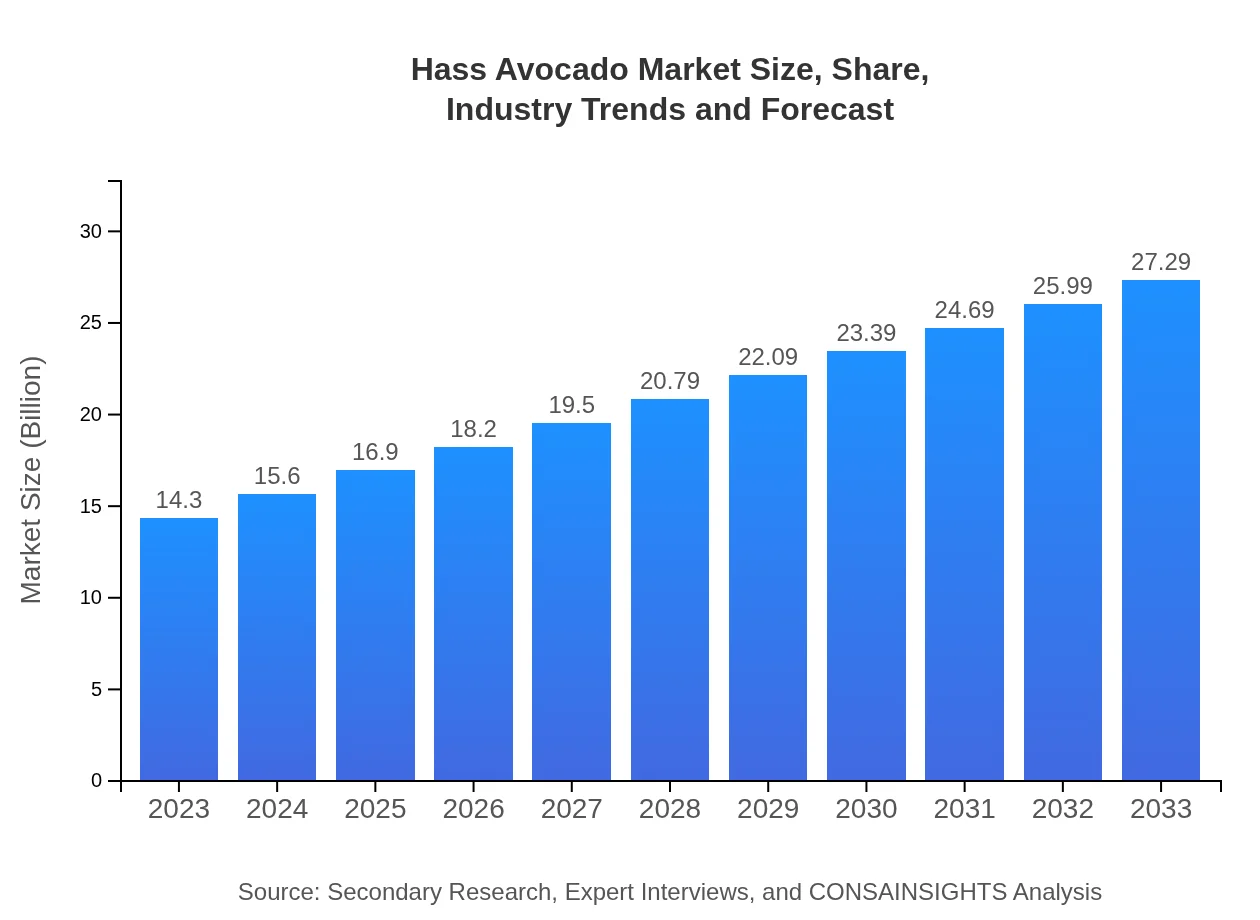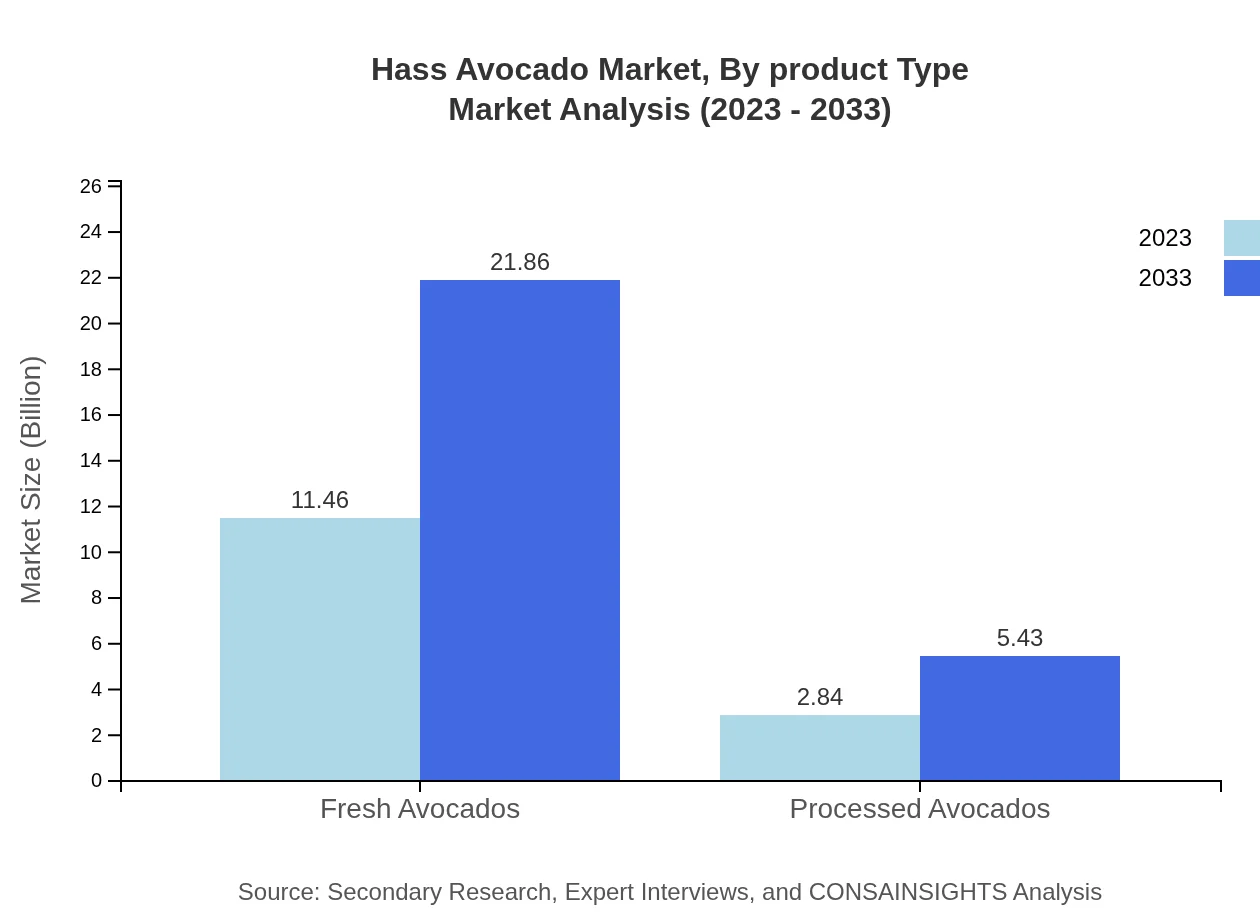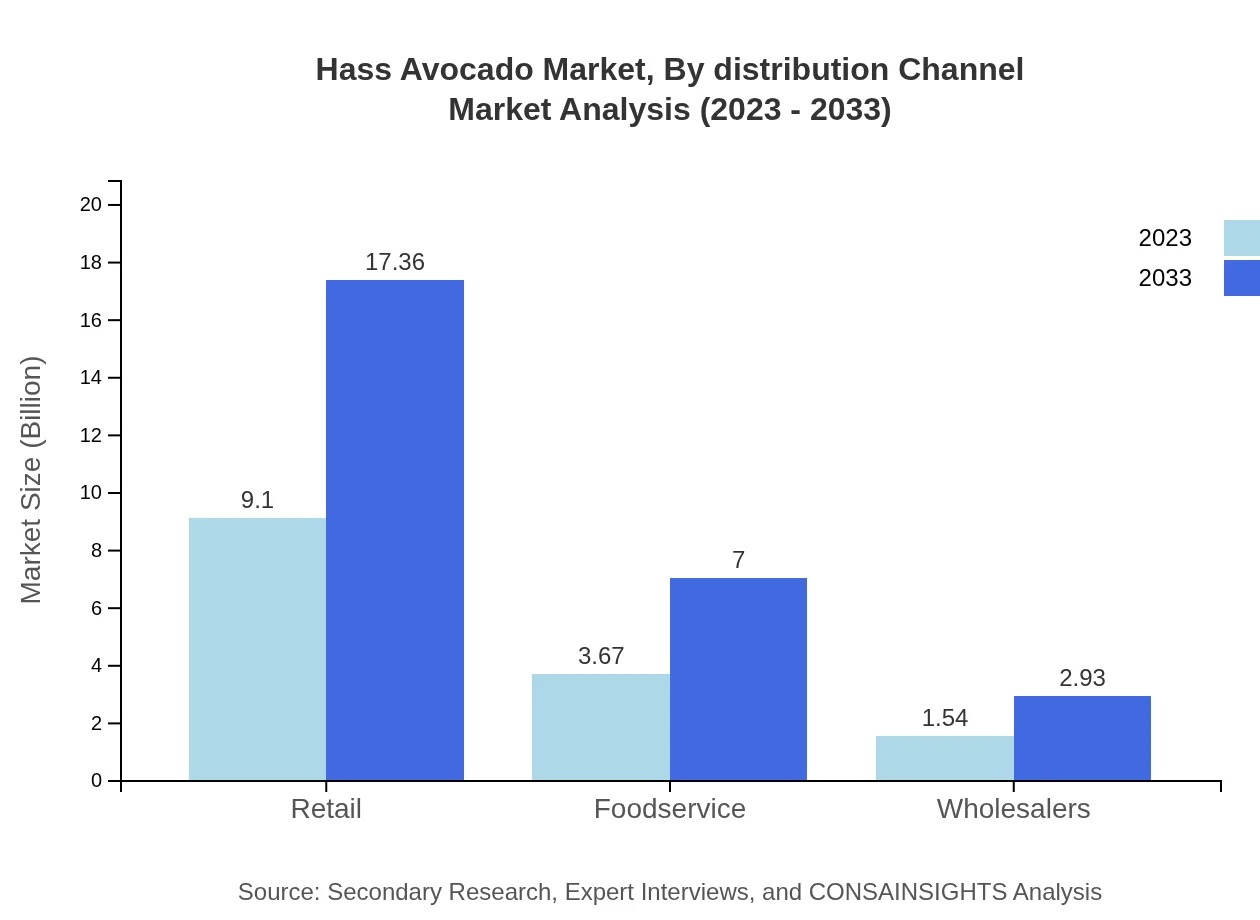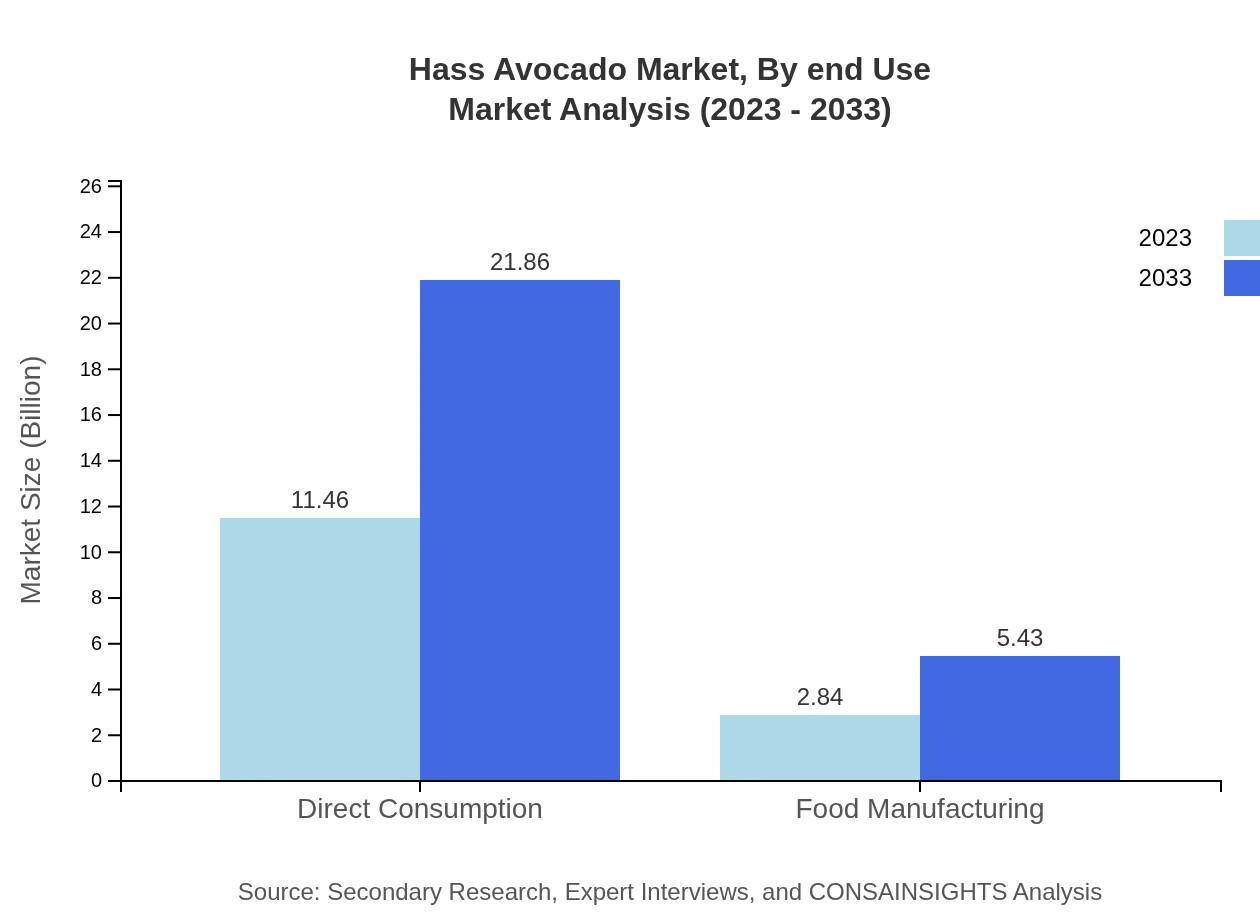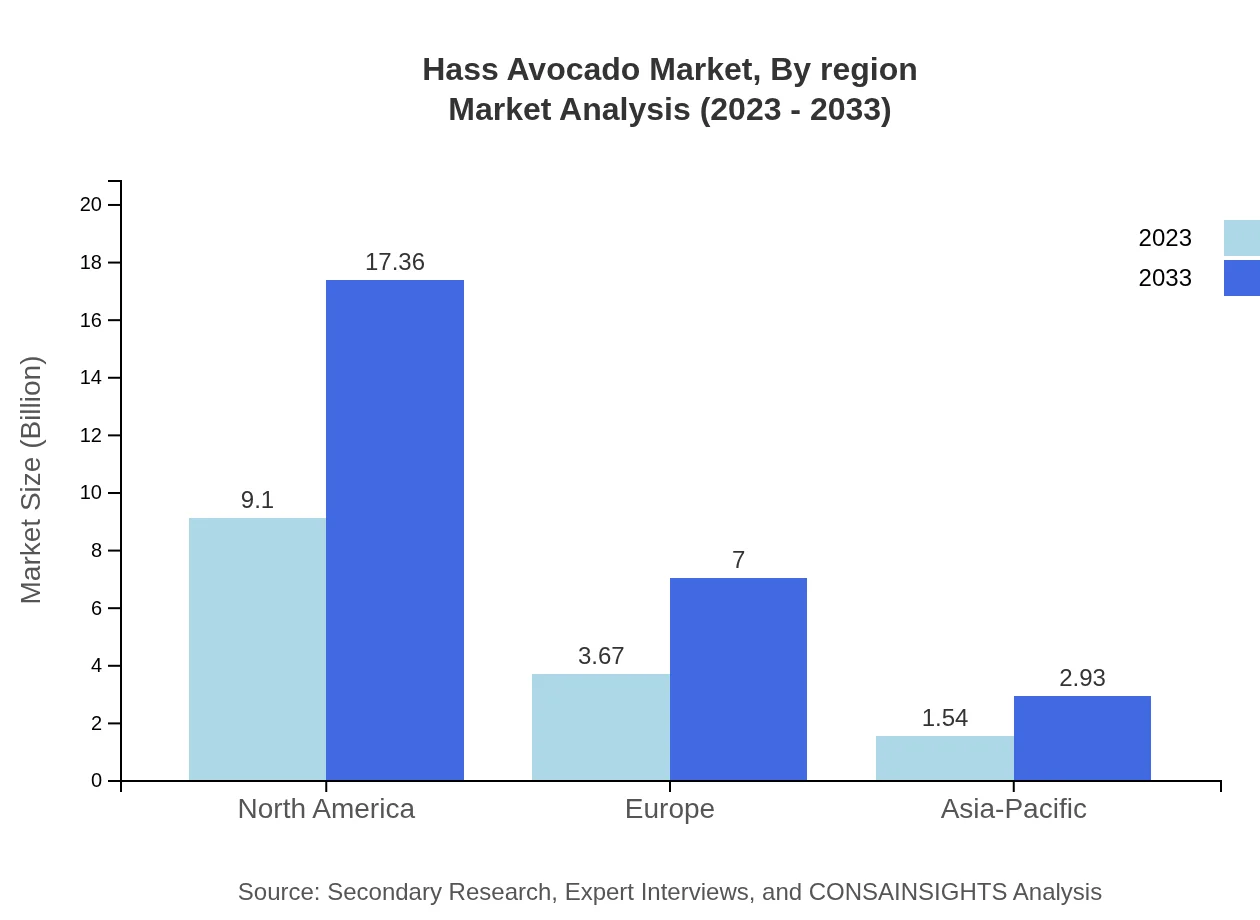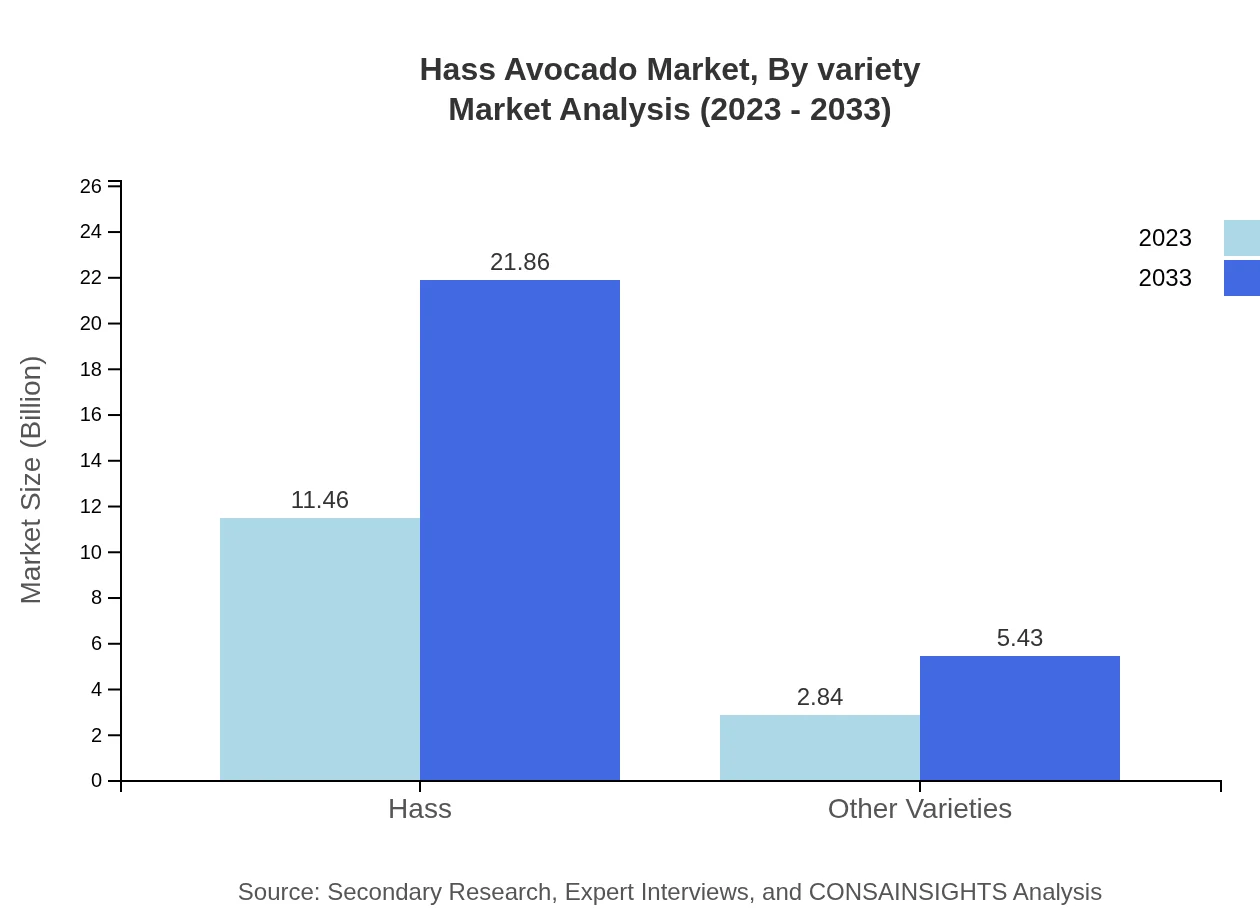Hass Avocado Market Report
Published Date: 02 February 2026 | Report Code: hass-avocado
Hass Avocado Market Size, Share, Industry Trends and Forecast to 2033
This report provides an in-depth analysis of the Hass Avocado market covering market trends, insights, and forecasts from 2023 to 2033. It focuses on market size, segmentation, and regional dynamics to equip stakeholders with critical information for strategic planning.
| Metric | Value |
|---|---|
| Study Period | 2023 - 2033 |
| 2023 Market Size | $14.30 Billion |
| CAGR (2023-2033) | 6.5% |
| 2033 Market Size | $27.29 Billion |
| Top Companies | Calavo Growers, Inc., Hass Avocado Board, Mission Produce, Inc., Westfalia Fruit |
| Last Modified Date | 02 February 2026 |
Hass Avocado Market Overview
Customize Hass Avocado Market Report market research report
- ✔ Get in-depth analysis of Hass Avocado market size, growth, and forecasts.
- ✔ Understand Hass Avocado's regional dynamics and industry-specific trends.
- ✔ Identify potential applications, end-user demand, and growth segments in Hass Avocado
What is the Market Size & CAGR of Hass Avocado market in 2023?
Hass Avocado Industry Analysis
Hass Avocado Market Segmentation and Scope
Tell us your focus area and get a customized research report.
Hass Avocado Market Analysis Report by Region
Europe Hass Avocado Market Report:
The European market for Hass avocados is expected to increase from $4.26 billion in 2023 to $8.12 billion in 2033. The growth is attributed to rising health trends and an increase in the availability of avocados in supermarkets and retail stores. Countries like the UK, Germany, and Spain are leading the trend in avocado consumption.Asia Pacific Hass Avocado Market Report:
In the Asia Pacific region, the Hass avocado market is projected to grow from $2.70 billion in 2023 to $5.15 billion in 2033. Countries like Australia and Japan are experiencing rising consumer interest in avocados, particularly among health-conscious buyers. This shifting dietary trend and increasing import of fresh produce contribute to the growth in this segment.North America Hass Avocado Market Report:
North America is a significant market for Hass avocados, with a projected increase from $5.49 billion in 2023 to $10.48 billion in 2033. The United States remains the largest consumer, with increasing awareness about health benefits driving strong demand across various consumer segments, including young adults and families.South America Hass Avocado Market Report:
The South American market shows limited growth potential, remaining relatively stable at approximately $0.01 billion from 2023 to 2033. While countries like Peru and Chile are significant producers, internal consumption remains low due to cultural dietary preferences, limiting expansion opportunities.Middle East & Africa Hass Avocado Market Report:
This region is poised to grow from $1.85 billion in 2023 to $3.53 billion in 2033. The increasing urban population and changing lifestyle trends underpin the growth in Hass avocado demand. Countries such as South Africa and the UAE are seeing more consumers opting for healthier food choices.Tell us your focus area and get a customized research report.
Hass Avocado Market Analysis By Product Type
The Hass avocado market can be segmented into fresh avocados and processed avocados. Fresh avocados dominate the market, making up 80.12% of the total share in 2023. Fresh avocados' revenue is projected to grow from $11.46 billion in 2023 to $21.86 billion in 2033. Processed avocados, including guacamole and avocado oil, hold a smaller share but are gaining traction, growing from $2.84 billion to $5.43 billion during the same period.
Hass Avocado Market Analysis By Distribution Channel
The distribution channels for Hass avocados include retail, foodservice, and wholesalers. Retail channels dominate with a 63.61% market share in 2023, indicating a strong preference for consumers to purchase avocados directly from grocery stores. Foodservice channels account for 25.65% of the market share, driven by the increasing popularity of avocados in restaurants and fast-casual dining. Wholesalers hold a smaller proportion at 10.74%, focusing on distributing bulk quantities to commercial buyers.
Hass Avocado Market Analysis By End Use
The major end-use segments include direct consumption and food manufacturing. Direct consumption accounts for a significant market share of 80.12% in 2023, emphasizing consumers' preference for fresh products. The food manufacturing segment, including products like dips and spreads, is projected to grow from $2.84 billion in 2023 to $5.43 billion in 2033, accounting for 19.88% of the overall market.
Hass Avocado Market Analysis By Region
Regional analysis has shown that North America leads with the highest market size, followed by Europe and Asia Pacific. With a dominant share in production and consumption, North America is expected to continue driving growth in the Hass avocado space. Europe is catching up with rising demand, while Asia Pacific is expected to export its unique varieties to meet growing interest.
Hass Avocado Market Analysis By Variety
The Hass variety dominates the market and is expected to maintain an 80.12% market share by 2033. Other varieties, while less popular, make up 19.88% of the market. The distinct taste, quality, and long shelf-life of Hass compared to other varieties solidify its standing as the market leader. The variety's popularity among consumers who prefer avocados for direct consumption or as a part of culinary dishes continues to drive market success.
Hass Avocado Market Trends and Future Forecast
Tell us your focus area and get a customized research report.
Global Market Leaders and Top Companies in Hass Avocado Industry
Calavo Growers, Inc.:
A leading global marketer and distributor of avocados and other perishable food products, Calavo supports growers in California and Mexico, specializing in organic avocados.Hass Avocado Board:
Created to promote the consumption and production of Hass avocados, this organization aids in research, marketing, and educational efforts to enhance avocado industry growth.Mission Produce, Inc.:
One of the world's leading suppliers of Hass avocados, Mission Produce emphasizes sustainability and innovation across its supply chain, exporting avocados to various global markets.Westfalia Fruit:
With a diverse portfolio of avocado products, Westfalia focuses on fresh and processed avocados, emphasizing organic production methods and global distribution.We're grateful to work with incredible clients.









FAQs
What is the market size of hass Avocado?
The global Hass avocado market is valued at approximately $14.3 billion in 2023 and is projected to grow at a CAGR of 6.5% over the next decade, reaching significant heights by 2033.
What are the key market players or companies in this hass Avocado industry?
Key market players in the Hass avocado industry include multinational agricultural companies, growers, distributors, and retailers, all actively engaged in various segments of the supply chain to cater to the increasing global demand.
What are the primary factors driving the growth in the hass Avocado industry?
Driving factors include increasing health consciousness among consumers, rising demand for plant-based diets, and the versatility of avocados in culinary uses, leading to a surge in both fresh and processed avocado products.
Which region is the fastest Growing in the hass Avocado?
The fastest-growing region for Hass avocados is North America, expected to grow from a market size of $5.49 billion in 2023 to $10.48 billion by 2033, indicating robust demand and market expansion.
Does ConsaInsights provide customized market report data for the hass Avocado industry?
Yes, ConsaInsights offers customized market report data tailored to specific needs within the Hass avocado industry, providing insights that cater to particular market segments and geographic regions.
What deliverables can I expect from this hass Avocado market research project?
Deliverables from the Hass avocado market research project include comprehensive market analysis reports, data on market sizes, growth forecasts, trend analyses, and insights into consumer behavior and competitive landscape.
What are the market trends of hass Avocado?
Market trends indicate a growing preference for organic and locally sourced Hass avocados, increased innovations in avocado-based products, and a rise in direct consumption channels, reflecting changing consumer dynamics.

